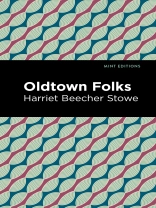Oldtown Folks (1869) is a historical novel by Harriet Beecher Stowe. Although her career peaked with the publication of abolitionist novel Uncle Tom’s Cabin (1852), Stowe continued to work as a professional writer throughout her life. A tale of family, faith, and perseverance, Oldtown Folks displays her impressive imaginative range and admirable moral outlook while illuminating aspects of early American life that would otherwise be consigned to history. After the death of his father and brother, Horace Holyoke moves with his mother to Oldtown, Massachusetts to live with her family. Staying at the home of his grandfather Jacob Badger, a prominent townsperson and successful miller, Horace listens to the stories of local religious figures, workers, and businesspeople who gather in the Badger family kitchen. Meanwhile, Harry and Tina Percival—a young brother and sister abandoned by their father, a British soldier who fled to England after the war—arrive in Oldtown after escaping abuse at the hands of a foster family. Taken in by the Badgers, the siblings befriend Horace and slowly adjust to life in a loving home. One Easter, the children travel to Boston with the local minister’s wife to visit with the wealthy Madame Kittery, who takes an interest in Harry and Horace and promises them, should they do well in school, that she will pay for them both to attend Harvard. Strengthened by the love of their community, anchored by their extended or adopted families, the three children grow up in a nation brimming with hope and meaningful change. Exploring religion, philosophy, and the value of education, Stowe’s novel is a powerful portrait of postwar New England for children and adults alike. Followed three years later by Oldtown Fireside Stories (1872), Oldtown Folks is an underappreciated masterpiece from the author of Uncle Tom’s Cabin, the most influential American novel of the nineteenth century. This edition of Harriet Beecher Stowe’s Oldtown Folks is a classic of American children’s literature reimagined for modern readers.
Since our inception in 2020, Mint Editions has kept sustainability and innovation at the forefront of our mission. Each and every Mint Edition title gets a fresh, professionally typeset manuscript and a dazzling new cover, all while maintaining the integrity of the original book.
With thousands of titles in our collection, we aim to spotlight diverse public domain works to help them find modern audiences. Mint Editions celebrates a breadth of literary works, curated from both canonical and overlooked classics from writers around the globe.
عن المؤلف
Harriet Beecher Stowe (1811-1896) was an American author and abolitionist. Born into the influential Beecher family, a mainstay of New England progressive political life, Stowe was raised in a devoutly Calvinist household. Educated in the Classics at the Hartford Female Seminary, Stowe moved to Cincinnati in 1832 to join her recently relocated family. There, she participated in literary and abolitionist societies while witnessing the prejudice and violence faced by the city’s African American population, many of whom had fled north as escaped slaves. Living in Brunswick, Maine with her husband and children, Stowe supported the Underground Railroad while criticizing the recently passed Fugitive Slave Law of 1850. The following year, the first installment of Uncle Tom’s Cabin was published in The National Era, a prominent abolitionist newspaper. Published in book form in 1852, Uncle Tom’s Cabin was an immediate international success, serving as a crucial catalyst for the spread of abolitionist sentiment around the United States in the leadup to the Civil War. She spent the rest of her life between Florida and Connecticut working as a writer, editor, and activist for married women’s rights.












